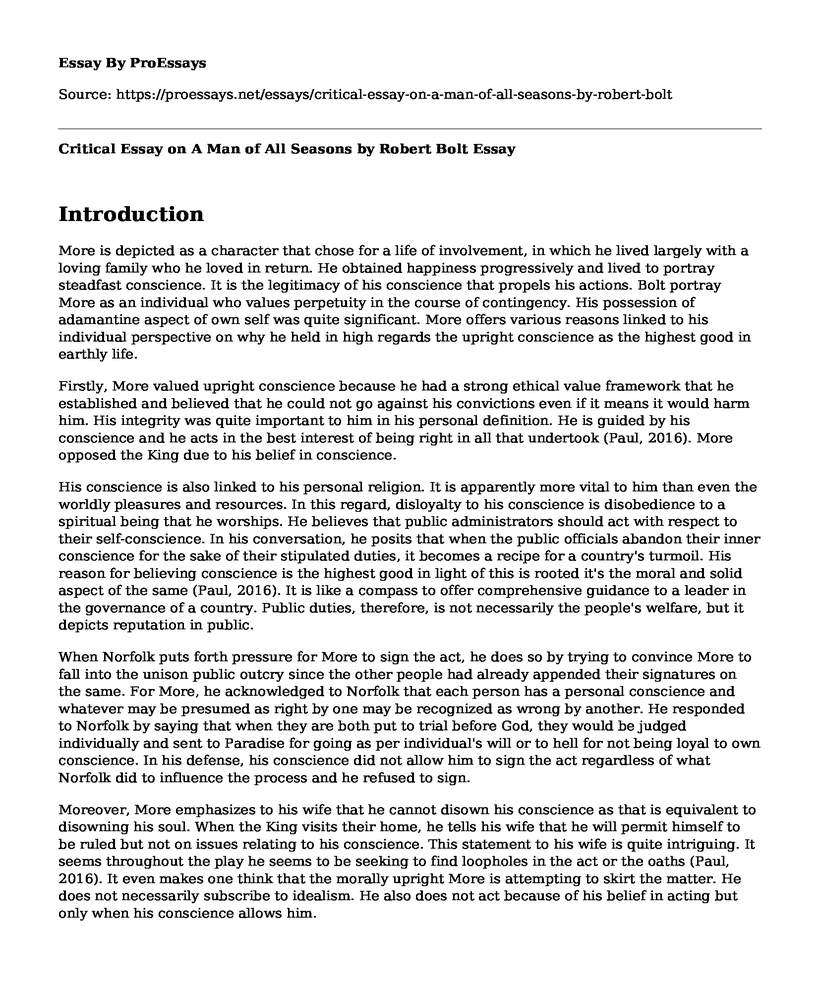Introduction
More is depicted as a character that chose for a life of involvement, in which he lived largely with a loving family who he loved in return. He obtained happiness progressively and lived to portray steadfast conscience. It is the legitimacy of his conscience that propels his actions. Bolt portray More as an individual who values perpetuity in the course of contingency. His possession of adamantine aspect of own self was quite significant. More offers various reasons linked to his individual perspective on why he held in high regards the upright conscience as the highest good in earthly life.
Firstly, More valued upright conscience because he had a strong ethical value framework that he established and believed that he could not go against his convictions even if it means it would harm him. His integrity was quite important to him in his personal definition. He is guided by his conscience and he acts in the best interest of being right in all that undertook (Paul, 2016). More opposed the King due to his belief in conscience.
His conscience is also linked to his personal religion. It is apparently more vital to him than even the worldly pleasures and resources. In this regard, disloyalty to his conscience is disobedience to a spiritual being that he worships. He believes that public administrators should act with respect to their self-conscience. In his conversation, he posits that when the public officials abandon their inner conscience for the sake of their stipulated duties, it becomes a recipe for a country's turmoil. His reason for believing conscience is the highest good in light of this is rooted it's the moral and solid aspect of the same (Paul, 2016). It is like a compass to offer comprehensive guidance to a leader in the governance of a country. Public duties, therefore, is not necessarily the people's welfare, but it depicts reputation in public.
When Norfolk puts forth pressure for More to sign the act, he does so by trying to convince More to fall into the unison public outcry since the other people had already appended their signatures on the same. For More, he acknowledged to Norfolk that each person has a personal conscience and whatever may be presumed as right by one may be recognized as wrong by another. He responded to Norfolk by saying that when they are both put to trial before God, they would be judged individually and sent to Paradise for going as per individual's will or to hell for not being loyal to own conscience. In his defense, his conscience did not allow him to sign the act regardless of what Norfolk did to influence the process and he refused to sign.
Moreover, More emphasizes to his wife that he cannot disown his conscience as that is equivalent to disowning his soul. When the King visits their home, he tells his wife that he will permit himself to be ruled but not on issues relating to his conscience. This statement to his wife is quite intriguing. It seems throughout the play he seems to be seeking to find loopholes in the act or the oaths (Paul, 2016). It even makes one think that the morally upright More is attempting to skirt the matter. He does not necessarily subscribe to idealism. He also does not act because of his belief in acting but only when his conscience allows him.
Conclusion
Throughout the play, More's steadfast stand remains unshaken and his assertion of remaining loyal to one's own values is of importance compared to surrendering to pressure from the public. His conversations with Wolsey, Norfolk, family, and Henry depicts why he values conscience as the highest good in earthly life even if it would lead him into a fray.
Reference
Paul, J. (2016). A More for All Seasons. History Today, 66 (12), 6.
Cite this page
Critical Essay on A Man of All Seasons by Robert Bolt. (2022, May 16). Retrieved from https://proessays.net/essays/critical-essay-on-a-man-of-all-seasons-by-robert-bolt
If you are the original author of this essay and no longer wish to have it published on the ProEssays website, please click below to request its removal:
- The War Room Essay Example
- Essay Sample on Assimilation of New York Immigrants
- Essay Sample on Architecture and Urbanization
- Essay Sample on Social Media and Ourselves: Networked Publics
- Fourth Dimension: Digital Communication Technology Essay
- Essay Sample on Beethoven's Music: Criticisms, Politics, and Heroic Style
- Rent 2008: A Tale of Love, Dreams and Reality - Essay Sample







